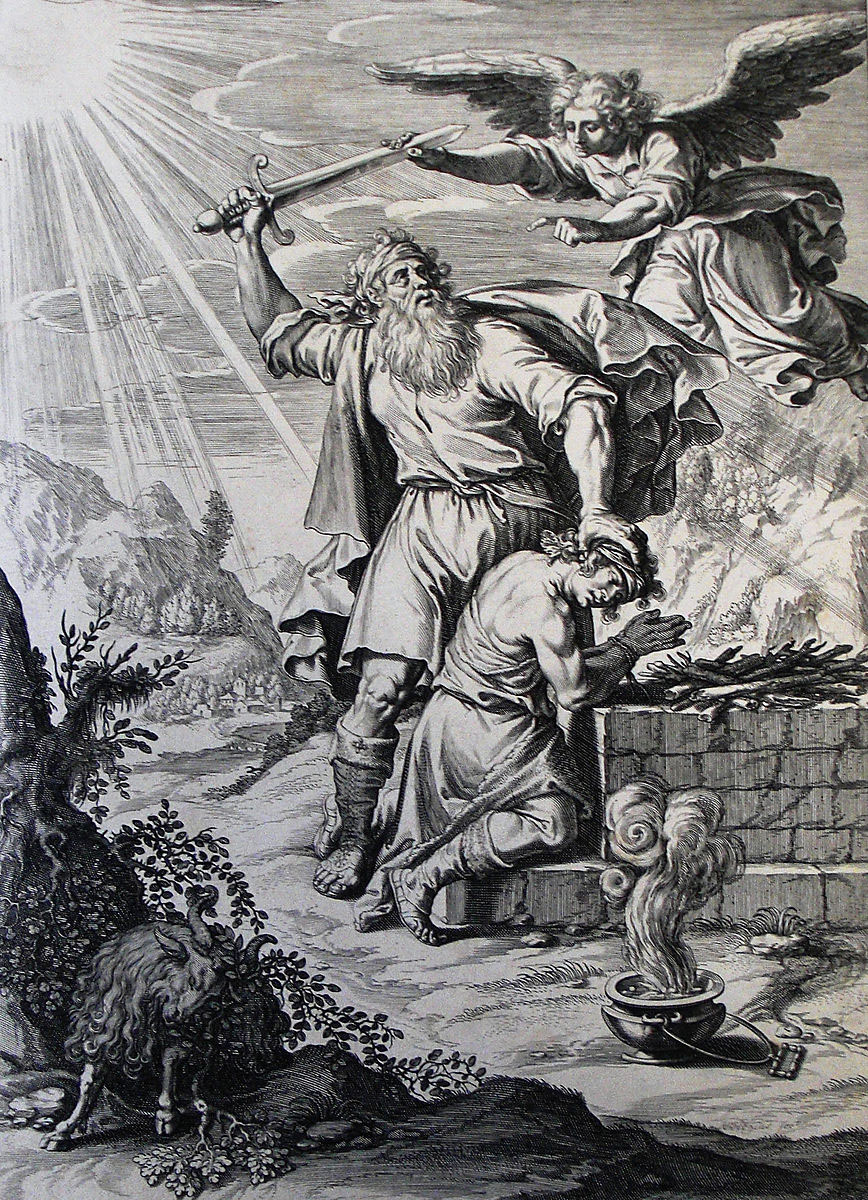 Phillip Medhurst under the Creative Commons Attribution-Share Alike 3.0 Unported license. In the collection of Revd. Philip De Vere at St. George’s Court, Kidderminster, England.
Phillip Medhurst under the Creative Commons Attribution-Share Alike 3.0 Unported license. In the collection of Revd. Philip De Vere at St. George’s Court, Kidderminster, England. I wonder if a major reason that the aged Abraham was willing
to sacrifice his young son Isaac, son of his old age whom we are told he loved extremely dearly,
was that the cries of children of old fathers are, compared with children of young fathers, heard less clearly…..
so that inaudibility of Isaac’s cry made possible near-killing.
Ironically we are informed that after this near-killing, Abraham
offered instead the gracious owner of a silent shofar, shofaring a ram.
Gen. 22:13 states:
יג וַיִּשָּׂא אַבְרָהָם אֶת-עֵינָיו, וַיַּרְא וְהִנֵּה-אַיִל, אַחַר, נֶאֱחַז בַּסְּבַךְ בְּקַרְנָיו; וַיֵּלֶךְ אַבְרָהָם וַיִּקַּח אֶת-הָאַיִל, וַיַּעֲלֵהוּ לְעֹלָה תַּחַת בְּנוֹ. 13 And Abraham lifted up his eyes, and looked, and behold behind him a ram caught in the thicket by his horns. And Abraham went and took the ram, and offered him up for a burnt-offering in the stead of his son.
This poem was inspired by an article in the 9/16/22 WSJ by Susan Pinker, “The Risks of Having an Old Father,” which reports experiments on mice performed by Noriko Osumi, a professor of developmental neuroscience at Tohoku University in Japan:
A comparison between the two groups revealed that mice with young fathers were far more likely to have rich and complex cries than those with older fathers. The patterns of sound they emitted were also more likely to resemble each other. In comparison, the pups with older fathers cried less overall. Their vocalizations were more variable, yet had a more limited repertoire of sounds.
The study also found that pups with older fathers weighed less, which I expect may be related to the way they communicate. An animal with a sporadic, weak cry is likely to attract less attention from its mother, so it would nurse less and gain less weight.
In an article in thetorah.com, “Rosh Hashanah: The Original Meaning of Blowing a Teruah,” Shawn Ruby intriguingly writes:
I suggest that teruah as a human response to the blowing of a horn or trumpet is the meaning of the phrase “teruah blast” in Numbers 10. A standard blast (tekiah) is just the sound of the horn, while a teruah blast is one designed to elicit a response. The term teruah refers to the collective response, while the phrase uteka’atem teruah refers to the blast that is blown to elicit the response.
In other words, the key difference is not in length, pitch, or tone, but in the cultural understanding of the people, who know to respond with a collective shout to a certain way of blasting the horn or trumpet.
According to this explanation, the reason why cries of children of old fathers are weaker than those of young fathers, is that old fathers are less able to evoke responses, being poorer shofars, as it were, than younger fathers.
The effectiveness of the blasts of a shofar on Rosh Hashanah is perhaps related to the fact that according to Gen. 22:13, the shofar is an instrument whose ability to help man communicate with God was first discovered by Abraham, the aged father of a young child.
Gershon Hepner is a poet who has written over 25,000 poems on subjects ranging from music to literature, politics to Torah. He grew up in England and moved to Los Angeles in 1976. Using his varied interests and experiences, he has authored dozens of papers in medical and academic journals, and authored “Legal Friction: Law, Narrative, and Identity Politics in Biblical Israel.” He can be reached at gershonhepner@gmail.com.























 More news and opinions than at a Shabbat dinner, right in your inbox.
More news and opinions than at a Shabbat dinner, right in your inbox.